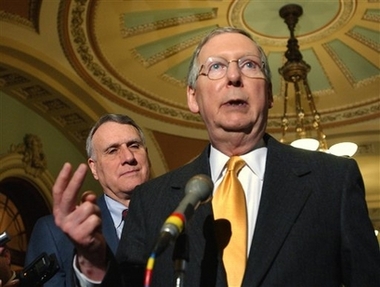Senate GOP turns back Iraq pullout plan
(AP)Updated: 2007-03-16 09:05
WASHINGTON - Democrats aggressively challenged President Bush's Iraq policy at both ends of the Capitol on Thursday, gaining House committee approval for a troop withdrawal deadline of Sept. 1, 2008, but suffering defeat in the Senate on a less sweeping plan to end US participation in the war.
"I want this war to end. I don't want to go to any more funerals," said New York Rep. Rep. Jose Serrano , one of several liberal Democrats who have pledged their support for the legislation despite preferring a faster end to the war.
"Nobody wants our troops out of Iraq more than I do," countered Rep. C.W. Bill Young of Florida, who sought unsuccessfully to scuttle the timeline for a troop withdrawal. "But we can't afford to turn over Iraq to al-Qaida."
In the Senate, after weeks of skirmishing, Republicans easily turned back Democratic legislation requiring a troop withdrawal to begin within 120 days. The measure set no fixed deadline for completion of the redeployment, but set a goal of March 31, 2008. The vote was 50-48 against the measure, 12 short of the 60 needed for passage.
Senate Democrats promptly said they would try again to force a change in Bush's policy beginning next week when they begin work on legislation providing money for the war in Iraq and Afghanistan.
The developments coincided with the traditional St. Patrick's Day luncheon in the Capitol, an annual social event hosted by the speaker of the House and attended by the president. For an hour or so, while lawmakers were debating the war, Bush and the leader of the political opposition, Speaker Nancy Pelosi , were seated near one another in an ornate hall not far from the Capitol Rotunda.
If they discussed the war, which has so far claimed the lives of more than 3,200 US troops, there was no evidence of it.
The day's votes in Congress underscored the extraordinary, unpredictable wartime clash between commander in chief and lawmakers.
In the House, only one committee Democrat, liberal Rep. Barbara Lee of California, voted against her party's plan, saying it did not go far enough. "I believe the American people sent a mandate to us to bring home our men and women before the end of the year," she said.
Overall, the committee vote strongly suggested Democrats will be able to push their troop withdrawal timetable through the full House next week. Even so, there is little if any prospect the Senate will agree to anything remotely similar. And even if it does, Bush's threatened veto would force Pelosi and other war critics back to the drafting table.
It took weeks for the Senate to agree to hold a formal debate on Democratic calls for a change in war policy, and by the time it occurred, the result was utterly predictable. So much so that Sen. John McCain , the Arizona Republican who is running for the White House in 2008, skipped the vote to campaign in Iowa.
Senate Republican Leader Mitch McConnell of Kentucky led the opposition to the measure.
"This is a dangerous piece of legislation. It is constitutionally dubious and it would authorize a scattered band of United States senators to tie the hand" of the commander in chief, he said.
McConnell said it would be "absolutely fatal" to the mission of US troops in
Iraq.
| 1 | 2 |  |
|
||
|
||
|
|

